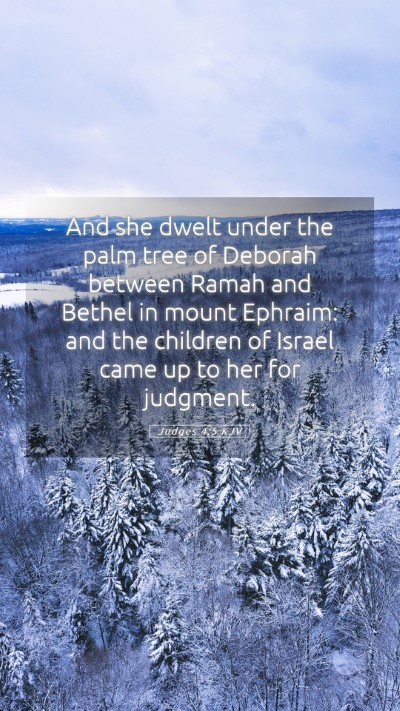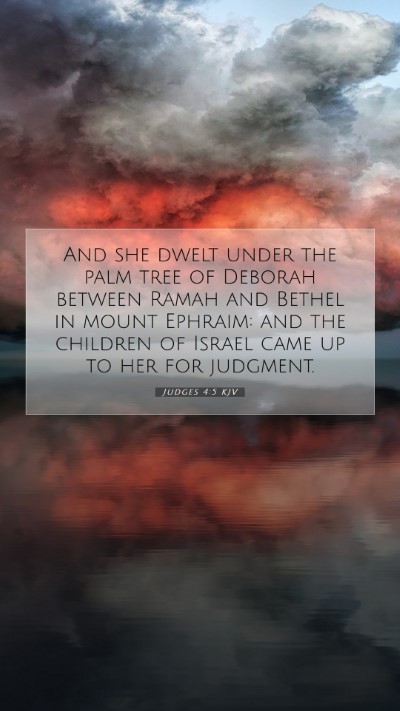Old Testament
Genesis Exodus Leviticus Numbers Deuteronomy Joshua Judges Ruth 1 Samuel 2 Samuel 1 Kings 2 Kings 1 Chronicles 2 Chronicles Ezra Nehemiah Esther Job Psalms Proverbs Ecclesiastes Song of Solomon Isaiah Jeremiah Lamentations Ezekiel Daniel Hosea Joel Amos Obadiah Jonah Micah Nahum Habakkuk Zephaniah Haggai Zechariah MalachiJudges 4:5 Meaning
What is the meaning of Judges 4:5?
And she dwelt under the palm tree of Deborah between Ramah and Bethel in mount Ephraim: and the children of Israel came up to her for judgment.
Judges 4:5 Bible Verse Meaning
Bible Verse Commentary: Judges 4:5
Verse: Judges 4:5 states, "She lived under the palm of Deborah, between Ramah and Bethel in the hill country of Ephraim, and the Israelites went up to her to have their disputes decided."
This verse provides a glimpse into the life of Deborah, highlighting her role as a judge and prophetess in Israel. As we delve deeper, we will explore various interpretations and meanings drawn from renowned public domain commentaries.
Contextual Background
The book of Judges highlights a tumultuous period in Israel’s history characterized by cycles of sin, oppression, repentance, and deliverance. Deborah stands out as a significant female figure during a time when male leadership was the norm. Her actions illustrate God’s sovereignty in raising leaders regardless of societal norms.
Commentary Insights
Matthew Henry's Commentary
Matthew Henry notes that Deborah was not just a judge but a prophetess, implying a dual role of providing both civil and spiritual leadership. He emphasizes her wisdom, indicating that people came to her for counsel, which signifies her respected position. Henry also highlights the location of her dwelling, which symbolizes her as a central figure in Israel's community.
Albert Barnes' Notes
Albert Barnes focuses on the geographical implications of Deborah's palm tree location. This setting suggests a place of fair judgment, resembling an ancient court where disputes would be settled impartially. Barnes points out that the Israelites' turn to Deborah reflects their acknowledgement of her authority and God-given wisdom, showcasing the path to restoration and guidance during their crisis.
Adam Clarke's Commentary
Adam Clarke examines the symbolic implication of the “palm tree,” which often represents victory and peace. He suggests that this representation aligns with Deborah's role in leading Israel to victory over their oppressors. Clarke further notes the significance of women in leadership roles, showcasing that God’s direction often breaks traditional molds for the sake of His purpose.
Meaning and Application
Bible verse meanings derived from Judges 4:5 draw attention to several key themes:
- Leadership: Deborah exemplifies that effective leadership comes from wisdom and divine calling rather than gender.
- Conflict Resolution: Her role emphasizes the importance of seeking wise counsel for resolving disputes, a practice echoed throughout Scripture.
- Trust in God's Plan: The Israelites' return to Deborah symbolizes their faith in God's choice of leaders and His overarching plan for their deliverance.
Bible Study Insights
This verse serves as a pivotal point for Bible study groups or online Bible study sessions, particularly in the exploration of women in the Bible and their roles in spiritual leadership. It prompts discussions on:
- Comparative analysis of leadership in the Old and New Testaments.
- The role of women in society according to biblical texts.
- How to interpret Bible verses regarding societal norms and divine instructions.
Cross References
Judges 4:5 can also be cross-referenced with:
- Exodus 18:13-26 - Moses seeking advice for judging the people.
- 1 Samuel 12:23 - Samuel as a leader and intercessor for Israel.
- 1 Timothy 2:12 - New Testament teachings on women in leadership contexts.
Conclusion
Judges 4:5 encapsulates various dimensions of Bible verse interpretations through its depiction of Deborah's leadership, which calls for a nuanced understanding of Scripture analysis and Biblical exegesis. Each commentary sheds light on how this verse speaks to issues of authority, wisdom, and divine guidance, making it a profound topic for Bible study insights. Ultimately, it reminds us that God’s selection of leaders is based on their obedience and availability rather than societal expectations.


